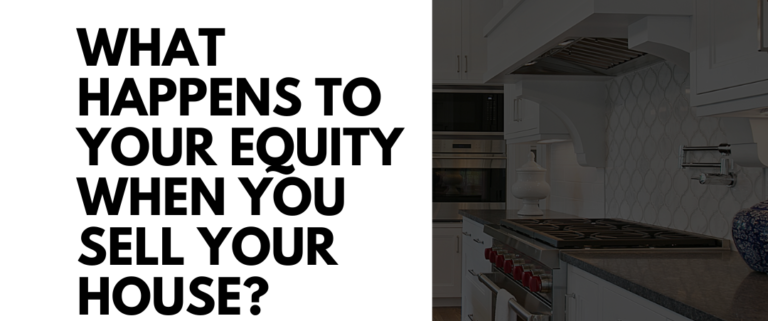What Happens to Your Equity When You Sell Your House?
When you own a home, you have the opportunity to build equity. Equity is the portion of your home’s value that you own outright—it’s the difference between what your home is worth and what you still owe on your mortgage.
Many factors affect the amount of equity you have in your home, including the housing market, the amount of your down payment, and the length of time you’ve been making mortgage payments.
If you own a home and you’re thinking of selling, you may be wondering what will happen to your equity. Keep reading to learn more about what happens to your equity when you sell your house.
What equity is
Equity is the amount of your home’s value that you own outright. For example, if your home’s market value is $250,000 and you still owe $200,000 on your mortgage, then you have $50,000 in equity. Equity isn’t always easy to access, however.
To access your equity, you’d have to refinance your mortgage, take out a home equity loan or line of credit, or sell your home. In addition to the amount of equity you have in your home, you’ll also need to figure out how much of the gain in equity you’ll actually be able to take with you when you sell.
For example, if your home’s value increased to $400,000 after 5 years, and you owe $200,000 on your mortgage, you’ll have $200,000 in equity. But, depending on your location and the amount of gain in the value of your home, you may not be able to take all of the equity with you when you sell. //
How to build equity
Building equity can be a slow process and it will depend on a few factors, including the housing market, current interest rates, and how long you’ve been making payments on your mortgage.
One way to slow and steadily grow your equity is to make larger payments on your mortgage when you can. By making a larger payment each month you’ll pay down your loan balance and build more equity in your home at a faster pace. If you do decide to make a larger payment each month, make sure you check with your mortgage lender.
Some mortgages have early prepayment penalties that can cost you if you pay down your loan balance too quickly. Another option for building equity quickly is to make improvements to your home that add to its value.
This could include renovating your kitchen or upgrading certain features in your home. When you do make improvements to your home, it’s important to keep the paperwork so you can show to potential buyers and get the most out of your equity when you sell.
What happens to your equity when you sell your house
When you sell your house, you’ll need to pay off your loan balance before you can collect any of the equity you have in the home. This will typically include any closing costs and Realtor commissions that you owe.
Depending on the amount of equity you have in the home and the amount of gain in the value of your home when you sell, you may be able to keep all or some of the equity you have in your home.
If you’ve made improvements to your home, it’s important to keep all the paperwork so you can show potential buyers the value of the improvements and get the most out of your equity when you sell.
Should you sell your house or refinance
One of the most common questions people ask is whether they should sell their house or refinance their mortgage. Selling your house is a great way to access the equity you have built up in your home, but it may not always be the best option. Refinancing your mortgage is another way to access your equity.
With a refinancing, you can take out a larger loan and use the extra money to pay off debts, make home improvements, or use it in other ways. With a refinance, you can get a lower interest rate and pay off your loan over a longer period of time.
The key to deciding which option is best for you is to do the math and to make sure you understand the costs associated with both options. //
How to get the most out of your equity
If you have built up equity in your home and you’re thinking of selling, there are a few steps you can take to get the most out of your equity when you sell. First, talk to your Realtor about the current housing market in your area and what the potential sale price of your home could be.
Next, make sure you understand the closing costs and Realtor commissions associated with the sale. Finally, make sure you have documentation of any improvements you have made to your home so you can show potential buyers and get the most out of your equity. //
Conclusion
Equity is an important part of home ownership and it can be a great resource when you’re ready to sell. If you’re thinking of selling your house, it’s important to understand what happens to your equity when you do.
Equity is essentially the portion of your home’s value that you own outright, and it can be a great way to access money for home improvements, pay off debts, or use it in other ways.
When you do decide to sell your home, it’s important to do the math and to make sure you understand the costs associated with the sale so you get the most out of your equity.





